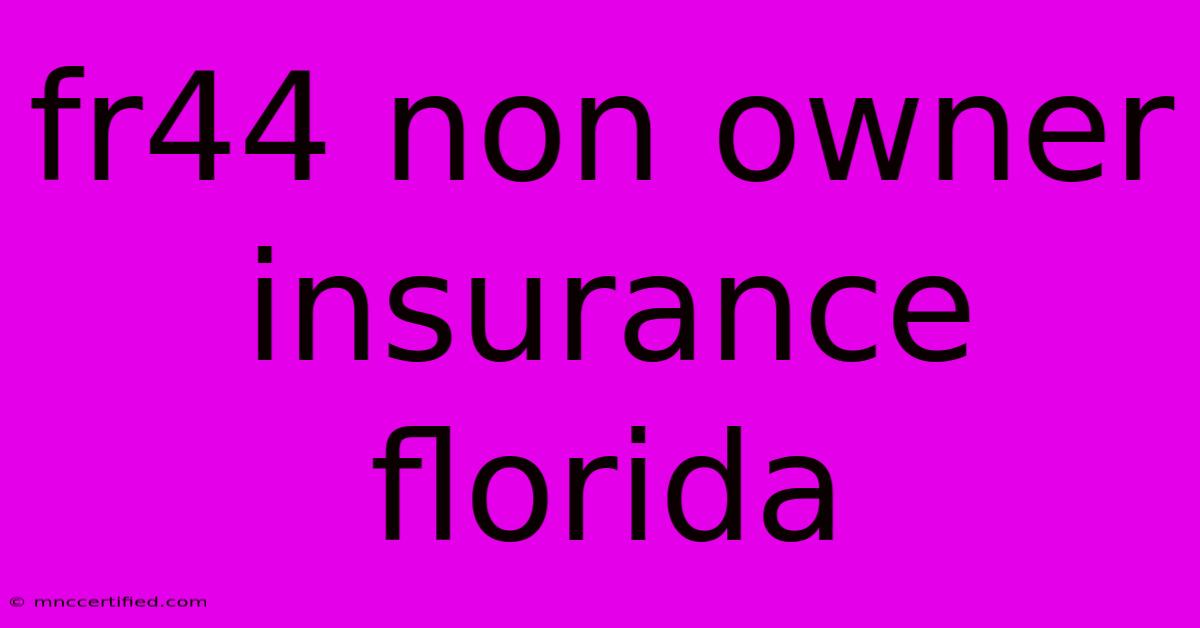Fr44 Non Owner Insurance Florida

Table of Contents
FR44 Non-Owner Insurance in Florida: A Comprehensive Guide
Finding the right car insurance in Florida can be tricky, especially if you don't own a vehicle. If you've been required to obtain an FR44 certificate, understanding your options is crucial. This guide will walk you through everything you need to know about FR44 non-owner insurance in Florida.
What is FR44 Insurance?
In Florida, an FR44 certificate of insurance is proof of financial responsibility. It's not a standard car insurance policy; instead, it demonstrates that you have the minimum liability coverage required by the state, even if you don't own a car. This is often mandated by the Department of Highway Safety and Motor Vehicles (FLHSMV) after a driving infraction or court order.
Think of it as a specialized form of insurance designed to prove you can cover potential damages caused by accidents while driving someone else's vehicle. It specifically addresses the liability aspect—covering injuries or damages to others—not your own vehicle.
Who Needs FR44 Insurance?
You might need FR44 non-owner insurance in Florida if:
- You've been involved in an accident without insurance: This is a common reason for requiring FR44. The state wants to ensure you can pay for any damages you caused.
- You have a suspended license: Restoring driving privileges often requires proof of financial responsibility, frequently fulfilled by an FR44 certificate.
- You're a high-risk driver: A history of accidents or traffic violations can lead to this requirement.
- Court Order: A judge may mandate FR44 insurance as part of a sentence or agreement.
How Does FR44 Non-Owner Insurance Work in Florida?
FR44 insurance in Florida typically covers bodily injury and property damage liability. The minimum coverage amounts are set by the state. It's crucial to confirm these minimums with your insurance provider, as they can change. The policy doesn't cover:
- Damage to the vehicle you're driving: This is covered under the owner's insurance policy.
- Your medical bills: You'd need separate medical payment coverage for that.
- Comprehensive or collision coverage: These coverages are typically only found in standard car insurance policies for vehicle owners.
Finding FR44 Non-Owner Insurance in Florida: Key Considerations
Securing FR44 coverage can be challenging, particularly for high-risk drivers. Here's what to keep in mind:
- Shop Around: Compare quotes from multiple insurers. Prices can vary significantly.
- Be Honest: Provide accurate information about your driving history. Failing to disclose information can lead to policy cancellation.
- Understand Your Coverage: Don't just focus on the price; make sure you understand what the policy covers and what it doesn't.
- Check for Discounts: Some insurers offer discounts for safe driving records or completing defensive driving courses.
- Ask Questions: Don't hesitate to ask your insurance agent questions about the policy's specifics and how it works.
Where to Find FR44 Insurance in Florida?
Many major insurance companies in Florida offer FR44 non-owner insurance. You can obtain quotes through:
- Online comparison websites: These sites allow you to compare quotes from multiple insurers simultaneously.
- Insurance agents: Working with an agent can provide personalized guidance and help you find the best policy for your needs.
- Directly from insurance companies: Contact the insurance companies directly to get quotes.
Maintaining Your FR44 Coverage
Once you have your FR44 certificate, it's essential to maintain it. Failure to do so can result in penalties, including further license suspension. Keep your payments up-to-date and notify your insurer of any changes to your driving record.
Key Takeaways
FR44 non-owner insurance in Florida is a critical requirement for many drivers. Understanding its purpose, coverage limitations, and how to obtain it is essential for maintaining your driving privileges and protecting yourself from potential liability. Remember to thoroughly research your options, compare quotes, and choose the policy that best suits your individual circumstances. Always verify current state minimums and requirements with the Florida Department of Highway Safety and Motor Vehicles before making a decision.

Thank you for visiting our website wich cover about Fr44 Non Owner Insurance Florida. We hope the information provided has been useful to you. Feel free to contact us if you have any questions or need further assistance. See you next time and dont miss to bookmark.
Featured Posts
-
Simpsons Voice Actor Pamela Hayden Retires
Nov 22, 2024
-
President Elect Trumps Cia Briefing
Nov 22, 2024
-
Does Dental Insurance Cover Byte
Nov 22, 2024
-
Penn State Sorority A Students Journey
Nov 22, 2024
-
John Prescott Unique Leader Says Unison
Nov 22, 2024